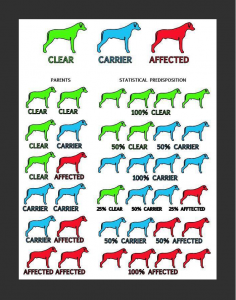Juvenile Myoclonic Epilepsy in Rhodesian Ridgebacks (JME)
JME was only recognised in 2015 after extensive research was carried out at two Universities. The University of Munich through the clinical examinations of the research team led by Professor Andrea Fischer and the University of Helsinki where Professor Hannes Lohi and his research team were learning the inheritance patterns of JME.
Nina Lindqvist (A Rhodesian Ridgeback breeder and Chairman of the Rhodesian Ridgeback Club of Finland) has been working hard alongside Prof. Fischer and Prof. Lohi as the JME co-ordinator getting information to a Facebook page (Myoclonic Epilepsy in Rhodesian Ridgebacks) and being on hand to answer any questions.
JME is an inherited defect only in Rhodesian Ridgebacks; it is from a recessive mode of inheritance which means:
An Affected dog would have inherited two copies of the mutation – one from each parent.
A Carrier of JME would have inherited only one copy of the mutation – from only one parent.
A Clear dog of JME obviously does not have any copies of the mutation. See the following chart to help you understand the inheritance patterns of JME.

The symptoms of JME are untypical to the more common Epileptic symptoms. Symptoms of JME are frequent twitches and myoclonic muscle jerks usually when the dog is sleeping or resting. All affected dogs have been of a young age ranging from 6 weeks to 18 months when symptoms were first noticed. Some dogs can also develop more severe tonic-clonic seizures (Grand Mal seizures) these seizures are more typical types of seizures associated with Epilepsy in general. Photo sensitivity has also been noticed in some affected dogs. These dogs have reacted to flashing lights.
There is now a commercial test available for all Rhodesian Ridgebacks. Here in the UK we can test at Laboklin. It is just a simple blood sample or buccal swab carried out and verified by your vet. The test will determine the JME status of your Rhodesian Ridgeback, either CLEAR, CARRIER or AFFECTED of JME.
There are treatments available which can reduce the symptoms of JME, some have even stopped the symptoms completely with very carefully managed medication, however there are some cases which are more difficult to manage. As with all medications, Anti-Epileptic Drugs can carry some unfortunate side effects as the body in some cases cannot tolerate these drugs. For example, some Rhodesian Ridgebacks have suffered with lethargy, anxiety, drowsiness, loss of co-ordination and more. It is important to monitor your dog when on any Anti-Epileptic Drugs. Vets in the UK are not all familiar with JME but Prof Andrea Fischer or Nina Linqvist are always available to discuss treatments with your vet or yourself.
If you have any questions about JME or have any other health related questions please do not hesitate to contact any of the Breed Club Health coordinators. You can find their detail who the Health coordinator is on the different clubs website, just select the link below.
Rhodesian Rdigeback Club of Great Britain
Midland and Northern Rhodesian Ridgeback Club
The Southern Rhodesian Ridgeback Association
Rhodesian Ridgeback Club of Scotland
As JME is a potentially fatal condition, it is highly recommended all Rhodesian Ridgebacks to be used in a breeding program are tested. Knowing the JME status of your RR’s you wish to breed from will help breeders to make sensible decisions and fully inform potential puppy owners.